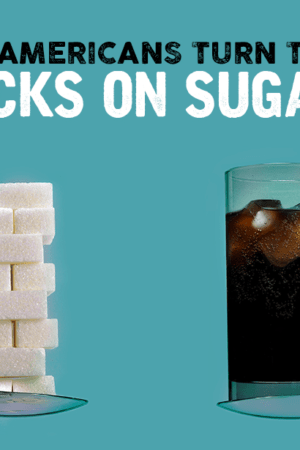If you grew up in the 90’s or earlier, you probably remember learning about the food pyramid. A bottom layer of grains, with fruit and vegetables on the second and most important layer of the pyramid, with meats and dairy next, and fats only to be “used sparingly” was what we were taught would lead to a healthy life. But in 2018, more than 2 in every 3 Americans are considered to be either overweight or obese.1
If health education was being taught when we were children, why are so many people unable to control their weight? Is more than 66 percent of the United States population just ignoring the food pyramid? Is almost everyone in the country eating too much dietary fat? Or could there be another cause?
Research supports the latter. According to a literature review published by the University of California at San Francisco, there may be one unlikely culprit to blame for our expanding waistlines: sugar.
Sneaky statistics
In the 1960’s, a large amount of nutrition research was focused on determining what the ideal American diet should be composed of. The findings of this research would be put into place in the form of the food pyramid that all of us would come to know. According to a recent literature review created by the by researchers at U.C.S.F, a large percentage of this research was corrupted by the Sugar Research Foundation. Today known as the Sugar Association, the Sugar Research Foundation paid three Harvard scientists about $50,000 in today’s dollars to conduct a review of the associations between sugar, fat, and heart disease.2
Sound innocent enough? It might have been, had the Sugar Research Foundation not handpicked the studies used in the review. By cherry-picking data and excluding conclusions that cast blame on sugar, the sugar industry was successfully able to shift blame for rising weights on saturated dietary fat instead. This lead to the low-fat diet craze of the 90’s, which obviously did little to curb the growing waistlines of Americans.
Over-sweetened America
Coincidentally, at the same time that our scales have begun weighing more, Americans are consuming more added sugar than ever before. According to data from the Obesity Society, Americans are now consuming a whopping 30% more added sugar in their diet when compared to just three decades ago.3
Dr. Jason Block, speaking on behalf of the Obesity Society, stated that this increase in added sugars could be a key factor in the expanding waistlines seen across the country.
“Added sugars pack non-nutritive calories into foods and can lead to weight gain,” he stated at a presentation of the data for the Obesity Society.
It’s time to ditch the sugar
What can we learn from this data? If you’re looking to lose weight, fat might not be your greatest enemy. In fact, saturated fats like those found in red meat, eggs, and coconut oil, can help you feel fuller and stave off hunger. Cutting down on sugar (and sugar-laden carbohydrates) can also help you cut down on the pounds.
NUTRITIONAL DISCLAIMER
The content on this website should not be taken as medical advice and you should ALWAYS consult with your doctor before starting any diet or exercise program. We provide nutritional data for our recipes as a courtesy to our readers. We use Total Keto Diet app software to calculate the nutrition and we remove fiber and sugar alcohols, like erythritol, from the total carbohydrate count to get to the net carb count, as they do not affect your blood glucose levels. You should independently calculate nutritional information on your own and not rely on our data. The website or content herein is not intended to cure, prevent, diagnose or treat any disease. This website shall not be liable for adverse reactions or any other outcome resulting from the use of recipes or recommendations on the Website or actions you take as a result. Any action you take is strictly at your own risk.
- This Grocery Store Team Lost Over 200 Pounds Using Keto - December 19, 2018
- Treating Diabetes with Weight Loss - December 12, 2018
- Ancient Nutrition Connects With Natural Partners - December 5, 2018




